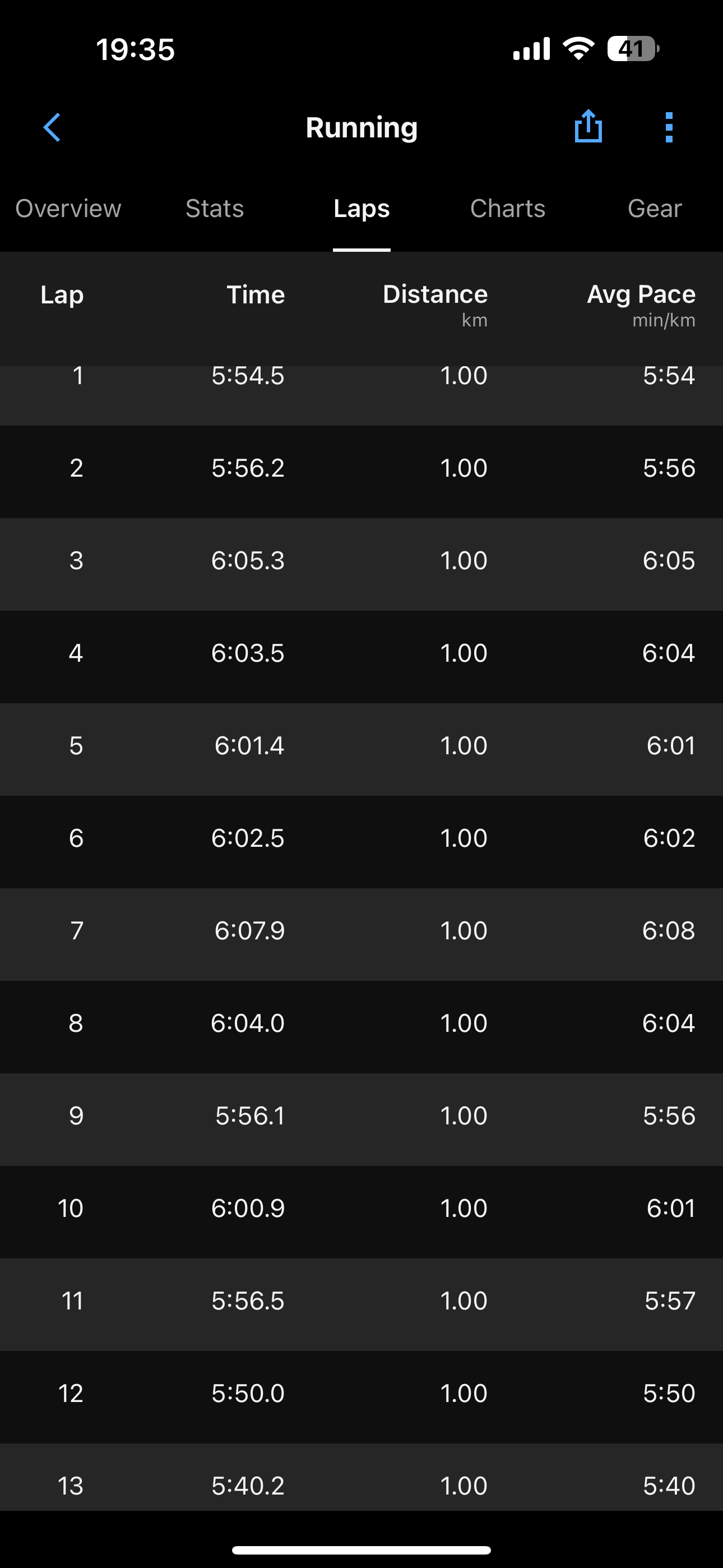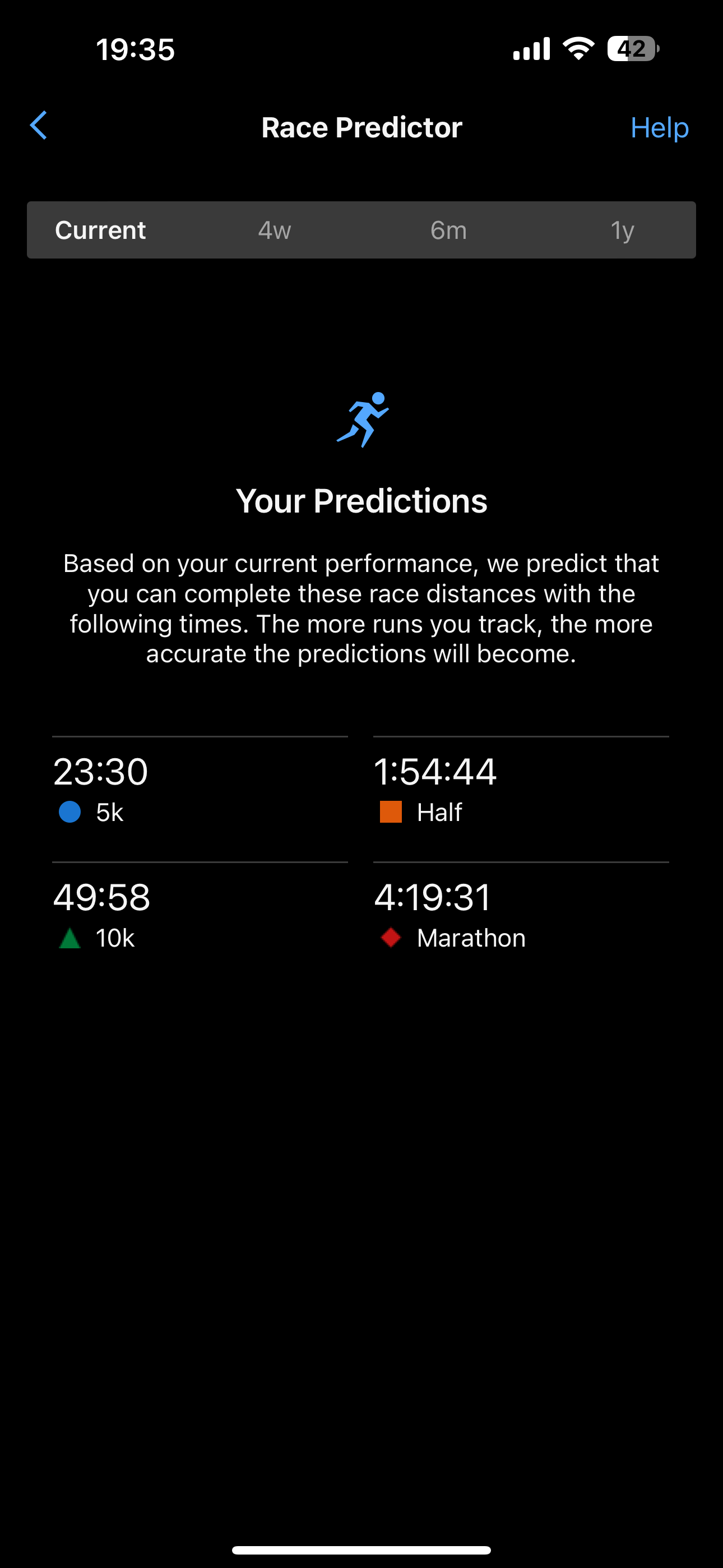I have been running thrice a week more or less consistently and decided to sign up for a half marathon on a whim. This would be my first half marathon ever, and I plan to follow an adapted "Less is More" training plan inspired by @CrissmanLoomis
My current estimate for a half marathon is 1:59 from my Garmin watch and around 2:05 from various internet calculators. A 1h 54 mins (5:24/km) target seems both quite doable to me, but challenging enough to require serious effort. The longest I've ever run is 12.1km one week ago, and have run 8 runs above 10k, ever (all within the last year). I ran a 10k in the same race last year with a time of 57:57 which i later lowered to 57:00 (5:42/km). My 5k PB is 26:15 (5:15/km).
Factors for:
I'm quite motivated and naturally enjoy running
Have been running fairly consistently to start the year so I have a good base of mileage
I'm starting from a low base so it's possible i have easy gains with a more structured plan. I never do consistent tempo or speed runs for example
I'm 92kg now, and expect to lose some weight by July which should improve my running economy
Factors against:
goal is probably too aggressive given my running history
Not very conscientious in general and dislike structured routines
My motivation is high right now but may wane (<15% chance)
Nagging knee injury that I plan to visit a physio for
92kg - no guarantee I won't gain weight by race time
The marathon is in 110 days. I will sign up later today and begin my 3 day a week training plan on Wednesday, and share a running log
Resolution Criteria:
YES:
I successfully run the half marathon and finish in a time of 1 hours 54 mins or less.
NO:
- I fail to participate in the half marathon for personal or injury reasons. I don't plan to not run unless the situation is truly unavoidable
- I participate but don't finish in less than 1:54 . If the race is delayed by a maximum of 1 more month, I will extend the deadline and resolve the question normally.
N/A:
If the race is delayed for more than 1 month from the original date or canceled for whatever reason.
I will only be betting YES here, and not selling but my YES bets will be calibrated to my confidence over time
People are also trading
yep, the race has been unfortunately postponed for 2 months as @CrissmanLoomis has posted so this resolves N/A. I was totally going to run a 1:50 ;). I also plan to run the delayed h/m and will post my times here anyway
Race postponed until September, so please resolve as N/A.
"After widespread consultations, evaluation and introspection, the Nairobi City Marathon, earlier scheduled for this Sunday, July 7, has been postponed to September 8."
@diadematus how are you doing? (Your notes below are making me nostalgic about my own half marathon! That was my longest run ever. Don’t recall my time, though!)
1st complete interval run in a while: 4 min warmup, then 6 laps of 400m at a target pace of 4:50/km alternated with 6 laps of 400 at a target pace of 5:50-6:00/km and a 1km cooldown. Ran much faster than my target pace for every lap and managed to complete all 6 laps which is rare for me. Felt more invigorated than tired after the race so I think I had something left in the tank after. Garmin thinks I'm "overreaching" though so I'm going to take it super light at the gym
Accidentally also set my second fastest 5k ever, and reasonably sure I could run a 54 min 10k at the moment
Long slow run, matching my previous longest run. Felt much much better after compared to my previous run. Focus is on trying to recover as well as I can and resume my structured plan from week 5, which will mean i wont have much of a taper. Garmin thinks I’’m on track to run a 1:54 hm which is some bullshit


Tempo run today: 1km warmup, then 6 laps aiming for 5:20-5:24/km. Goal was to do the laps at a pretty consistent clip and avoid getting carried away and running much faster and flaming out. Normally I can't complete this kind of pace after the 4th lap but my pacing seemed to have worked because I completed all 6 with some effort towards the end. According the my plan i should be doing 8km @5:42/km this week so I'm not too far off. Next steps are a freestyle long slow run this week, to see just how far I can go then resume my structured training next week. 58 days to go
(side note: i have started another episode of calorie tracking this week because i desperately want to lose some weight - at least ~5kg - before the run. Average weight last week was 91.66kg)
first long run back...focus was feeling out my knee and forcing myself to run slowly. Knee feels much better, and I even could go much faster for the last 2km. Not sure where in my training plan to resume from so I'll probably wing it next few sessions till I have a good idea where I am fitness-wise. 62 days to go
@traders created an offshoot market here - https://manifold.markets/diadematus/what-will-be-my-first-half-marathon
@CrissmanLoomis dang, blame Manifold's shitty notification system for not seeing this earlier. Training is...not going well? I hit a good training pace/cadence in the first 3-4 weeks and was making good progress but then I had a serious slump in motivation ~3 weeks ago, mostly prompted by frustration that increased activity was not leading to weight loss (which is my actual goal) and around the same time my knee flared up again. So I took some time off, and got a proper checkup and exercises from a physio. I'm much more motivated and resuming regular training this week although much, much less skeptical i will get close to 1:54. I still plan to give it my best shot though. Race is in 66 days so I have roughly ~8 weeks of really solid training to put in and see where the chips fall.
@diadematus Good to have the updates back! I was worried you were ghosting the effort. Now that there are two markets, feels like there should be arbitration opportunities. Anyway, moving the odds of success on this bet closer to the odds of the offshoot market.
km and time for your latest tempo run?
@CrissmanLoomis before i took time off I did two 5ks at roughly 5:19 and 5:24/km. when i run at that pace I flame out reliably at 5km so I might try to run slower at like 5:30/km but increase the distance
meta: appreciate the confidence but a 76% chance that i'll run a 1:54 half marathon strikes me as wildly optimistic. I'd currently put my odds at ~30%. If I trained perfectly for the next 12 weeks i'd probably run a 1:58 and I'm hoping i'll lose 6 or 7kg in that time to make up the rest
@diadematus Yes, you still have a ways to go. I don't think your log is up to date, but given that you've run over a kilometer at 4:45, I don't think speedwork at 4:58 will get your heart rate over 90% of max.
Have you lost 6-7kg before?
@CrissmanLoomis wait, just seeing this now. Nope! Never lost more than 2kg before which is bearish for me. I lost ~0.8kg over the last month despite being way more active which was annoying. But I'm trying things. IF mixed with calorie counting now is my new attempt
update: visited my parents over easter so I only had time for 2 runs: 1 recovery run and a labored long run (11.1km). The plan expects some missed sessions so I won't try to do a makeup session but will try to adhere more exactly moving forward. OTOH I'm losing weight at a ~0.5kg/week pace so that's positive development. Current VO2Max according to Garmin is 43mL/kg/min
I created a template Training Log for you with a chart and half-marathon time estimates!
https://docs.google.com/spreadsheets/d/1Pd4u1GNHfZdr5pFsoHqlYMSHkDKWp9Ahrq9uAVufYFE/edit?usp=sharing
Let me know if you have any suggestions or requests.
@CrissmanLoomis thanks! this is going to be quite helpful. i'll try to see if i understand the training log well enough, fill out the early portions and revert with any questions. does it account for if i don't stick to the program faithfully? e.g if i run some interval runs faster than expected
@CrissmanLoomis not really. i went out too hard over the previous long run so i decided to be extra cautious and not do really hard interval runs just 48 hours later.

